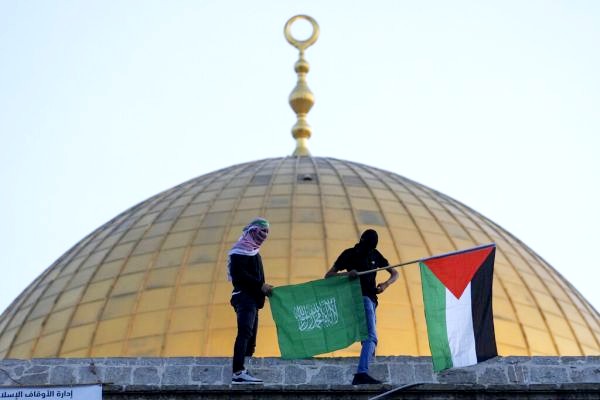As Ramadan begins, the spotlight shifts to Al-Aqsa Mosque, where recurring clashes between Israeli police and Palestinian rioters have become a grim tradition.
By Chaim Lax, Honest Reporting
As Muslims around the world begin to observe the holy month of Ramadan, many media outlets have been particularly focused on connecting Ramadan to the ongoing war against Hamas in Gaza as well as the possibility of rising tensions surrounding prayers at Al-Aqsa Mosque in Jerusalem.
Some outlets have referenced incidents of violence between Israeli police and Palestinian rioters that have occurred in the mosque and its environs during Ramadan over the past few years.
However, these reports fail to properly convey what led to these disturbances, either leaving out who started the melee or placing the blame solely on Israeli security forces.
For example, The Washington Post described the 2021 violence as “fighting between police and Palestinians” and the 2023 disturbances as “an Israeli police raid last spring to clear protesters who had locked themselves inside.”
Contrary to The Post’s description, the Israeli police were not simply fighting “Palestinians” or mere “protesters.”
Similarly, The Guardian referred to the 2022 and 2023 eruptions of violence simply as “police raids on the mosque,” while The New York Times has described them as “raids into the Aqsa compound by baton-wielding police forces firing tear gas and sponge-tipped bullets who have clashed with Palestinians throwing stones and setting off fireworks.”
As will be seen below, in the violent eruptions that occurred on the Temple Mount during Ramadan in recent years, each incident was initiated by Palestinian rioters and instigators and was responded to with force by the Israeli police, working to protect innocent worshipers, fellow security officers, and innocent bystanders outside the holy compound.
Although there had been violent disturbances between Palestinian rioters and the Israeli police throughout Ramadan in 2021, the violence peaked in the last weekend of the holy month (May 7 to 10).
On the night of May 7, following the last Friday prayers of Ramadan, Israeli police were compelled to respond with force after officers stationed on the Temple Mount were attacked with stone slabs, rocks, bottles, and firecrackers. In order to stem the violence and disrupt the rioters, Israeli security forces were forced to enter the Al-Aqsa Mosque itself.
According to Israeli authorities, these projectiles had been stockpiled in previous days throughout the holy complex in anticipation of that Friday’s disturbances and were reportedly meant to be used against Israeli security forces as well as against Jewish worshipers at the Western Wall below.
Following that Friday’s violence, intermittent disturbances continued throughout the weekend and into Monday, May 10 at the Al-Aqsa Mosque complex and the surrounding area.
That rioting included the barricading of the mosque as well as attacks against Israeli security forces with rocks, firecrackers, and other projectiles. It was only on that Monday that Israeli police were finally able to restore peace and order to the Temple Mount compound.
In 2022, Ramadan violence at the Al-Aqsa Mosque was once again instigated by a minority of Palestinian rioters and hooligans.
On Fridays April 15, April 22, and April 29, Israeli police were forced to enter the compound in order to disrupt riots that included the throwing of rocks, firecrackers, and other projectiles at security forces and toward the rear of the Western Wall, as well as the barricading of rioters within the mosque, preventing proper access to worshipers.
On April 29 (the last Friday of Ramadan that year), the rioting in the morning was so bad that at least one projectile landed in the Western Wall compound below. However, by that afternoon, order was restored and Ramadan prayers were able to end relatively peacefully.
In 2023, violence was instigated at the Al-Aqsa Mosque on the night of April 4/early morning of April 5, when rioters barricaded themselves within the mosque and attacked Israeli security forces with explosive devices, fireworks, and rocks.
In order to quell the disturbances, Israeli police were forced to enter the mosque and use riot dispersal methods while arresting those responsible for the violence.
During the melee that unfolded following the entry of Israeli forces into the Muslim holy site, social media erupted with context-free videos of Israeli police using violence against Palestinian agitators, inciting violence within the region and driving a false narrative of Israeli aggression around the world.
Every year, before Ramadan, the Israeli police undertake intensive preparations to “enable the freedom of worship while maintaining security and public order.”
So, too, this year, the Israeli police have released guidelines for the upcoming month of Ramadan, detailing the traffic changes, regulating of crowds, reinforcement of security forces, and restrictions that are in place (which are similar to past years’ guidelines).
This week begins the holiday of Ramadan. The Israel Police is actively facilitating the freedom of worship on the Temple Mount, while ensuring a balance between security needs and public safety. pic.twitter.com/i7Ru59sYJP
— Israel Police (@israelpolice) March 10, 2024
However, despite all the police preparations, there is the possibility this year that some Palestinians will seek to take advantage of the large crowds at the Al-Aqsa Mosque and the tense atmosphere due to the ongoing Israel-Hamas War in order to disrupt prayers and instigate violence against Israeli security forces.
If disturbances do erupt at Al-Aqsa Mosque during this year’s Ramadan, will the media report correctly on how the violence erupted, or will they only start the story with Israel’s response?
